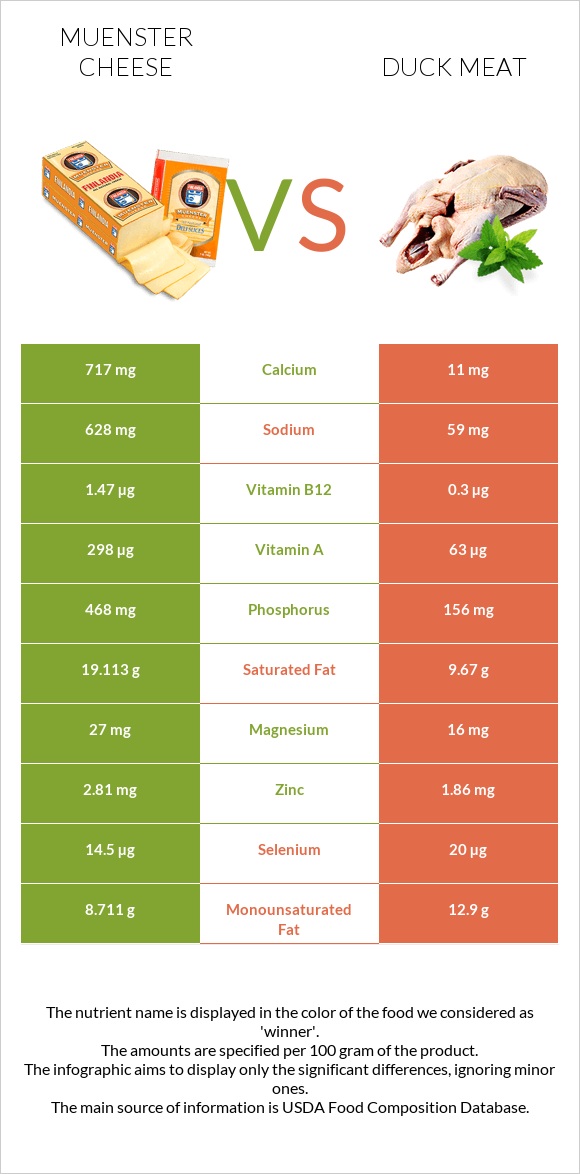Muenster cheese vs. Duck meat — In-Depth Nutrition Comparison
Compare
Significant differences between muenster cheese and duck meat
- Muenster cheese is richer in calcium, vitamin B12, phosphorus, and vitamin A, while duck meat is higher in vitamin B3, iron, copper, and vitamin B5.
- Muenster cheese covers your daily calcium needs 71% more than duck meat.
- Muenster cheese has 11 times more sodium than duck meat. Muenster cheese has 628mg of sodium, while duck meat has 59mg.
- Muenster cheese has a higher glycemic index (27) than duck meat (0).
Specific food types used in this comparison are Cheese, muenster and Duck, domesticated, meat, and skin, cooked, roasted.
Infographic

Infographic link
Mineral Comparison
Mineral comparison score is based on the number of minerals by which one or the other food is richer. The "coverage" charts below show how much of the daily needs can be covered by 300 grams of the food.
| Contains more MagnesiumMagnesium | +68.8% |
| Contains more CalciumCalcium | +6418.2% |
| Contains more ZincZinc | +51.1% |
| Contains more PhosphorusPhosphorus | +200% |
| Contains more PotassiumPotassium | +52.2% |
| Contains more IronIron | +558.5% |
| Contains more CopperCopper | +632.3% |
| Contains less SodiumSodium | -90.6% |
| Contains more ManganeseManganese | +137.5% |
| Contains more SeleniumSelenium | +37.9% |
Vitamin Comparison
Vitamin comparison score is based on the number of vitamins by which one or the other food is richer. The "coverage" charts below show how much of the daily needs can be covered by 300 grams of the food.
| Contains more Vitamin AVitamin A | +373% |
| Contains more Vitamin DVitamin D | +500% |
| Contains more Vitamin B2Vitamin B2 | +19% |
| Contains more Vitamin B12Vitamin B12 | +390% |
| Contains more FolateFolate | +100% |
| Contains more Vitamin EVitamin E | +169.2% |
| Contains more Vitamin B1Vitamin B1 | +1238.5% |
| Contains more Vitamin B3Vitamin B3 | +4584.5% |
| Contains more Vitamin B5Vitamin B5 | +477.9% |
| Contains more Vitamin B6Vitamin B6 | +221.4% |
| Contains more Vitamin KVitamin K | +104% |
All nutrients comparison - raw data values
| Nutrient |  |
 |
DV% diff. |
| Calcium | 717mg | 11mg | 71% |
| Vitamin B12 | 1.47µg | 0.3µg | 49% |
| Phosphorus | 468mg | 156mg | 45% |
| Saturated fat | 19.113g | 9.67g | 43% |
| Vitamin B3 | 0.103mg | 4.825mg | 30% |
| Iron | 0.41mg | 2.7mg | 29% |
| Vitamin A | 298µg | 63µg | 26% |
| Sodium | 628mg | 59mg | 25% |
| Copper | 0.031mg | 0.227mg | 22% |
| Polyunsaturated fat | 0.661g | 3.65g | 20% |
| Vitamin B5 | 0.19mg | 1.098mg | 18% |
| Vitamin B1 | 0.013mg | 0.174mg | 13% |
| Selenium | 14.5µg | 20µg | 10% |
| Vitamin B6 | 0.056mg | 0.18mg | 10% |
| Monounsaturated fat | 8.711g | 12.9g | 10% |
| Protein | 23.41g | 18.99g | 9% |
| Zinc | 2.81mg | 1.86mg | 9% |
| Choline | 15.4mg | 50.4mg | 6% |
| Cholesterol | 96mg | 84mg | 4% |
| Vitamin B2 | 0.32mg | 0.269mg | 4% |
| Fats | 30.04g | 28.35g | 3% |
| Magnesium | 27mg | 16mg | 3% |
| Vitamin E | 0.26mg | 0.7mg | 3% |
| Vitamin D | 0.6µg | 0.1µg | 3% |
| Calories | 368kcal | 337kcal | 2% |
| Vitamin D | 22 IU | 3 IU | 2% |
| Potassium | 134mg | 204mg | 2% |
| Vitamin K | 2.5µg | 5.1µg | 2% |
| Folate | 12µg | 6µg | 2% |
| Net carbs | 1.12g | 0g | N/A |
| Carbs | 1.12g | 0g | 0% |
| Sugar | 1.12g | 0g | N/A |
| Manganese | 0.008mg | 0.019mg | 0% |
| Tryptophan | 0.327mg | 0.232mg | 0% |
| Threonine | 0.888mg | 0.773mg | 0% |
| Isoleucine | 1.145mg | 0.872mg | 0% |
| Leucine | 2.26mg | 1.465mg | 0% |
| Lysine | 2.139mg | 1.486mg | 0% |
| Methionine | 0.569mg | 0.475mg | 0% |
| Phenylalanine | 1.24mg | 0.752mg | 0% |
| Valine | 1.482mg | 0.938mg | 0% |
| Histidine | 0.829mg | 0.462mg | 0% |
Macronutrient Comparison
Macronutrient breakdown side-by-side comparison
Protein:
23.41 g
Fats:
30.04 g
Carbs:
1.12 g
Water:
41.77 g
Other:
3.66 g
Protein:
18.99 g
Fats:
28.35 g
Carbs:
0 g
Water:
51.84 g
Other:
0.82 g
| Contains more ProteinProtein | +23.3% |
| Contains more CarbsCarbs | +∞% |
| Contains more OtherOther | +346.3% |
| Contains more WaterWater | +24.1% |
~equal in
Fats
~28.35g
Fat Type Comparison
Fat type breakdown side-by-side comparison
Saturated fat:
Sat. Fat
19.113 g
Monounsaturated fat:
Mono. Fat
8.711 g
Polyunsaturated fat:
Poly. Fat
0.661 g
Saturated fat:
Sat. Fat
9.67 g
Monounsaturated fat:
Mono. Fat
12.9 g
Polyunsaturated fat:
Poly. Fat
3.65 g
| Contains less Sat. FatSaturated fat | -49.4% |
| Contains more Mono. FatMonounsaturated fat | +48.1% |
| Contains more Poly. FatPolyunsaturated fat | +452.2% |





